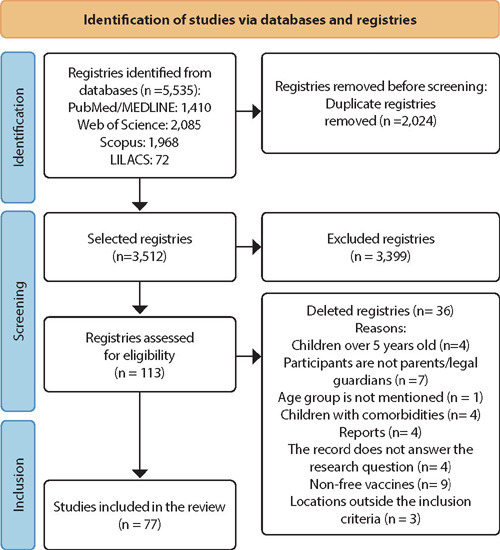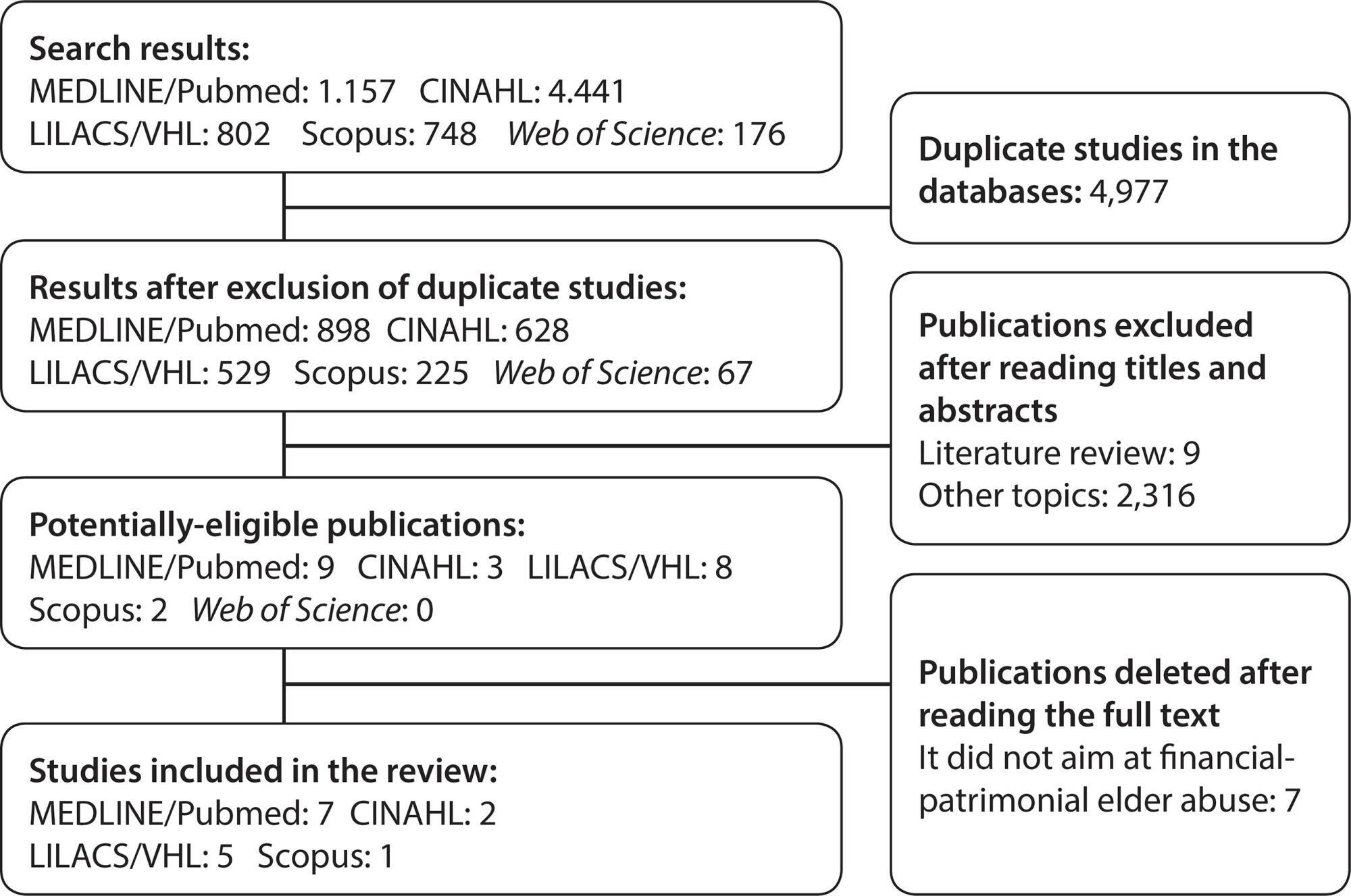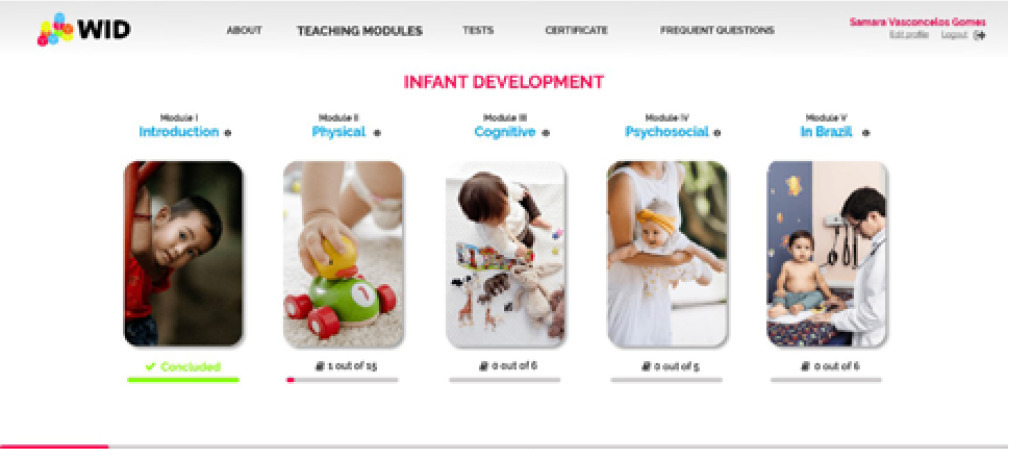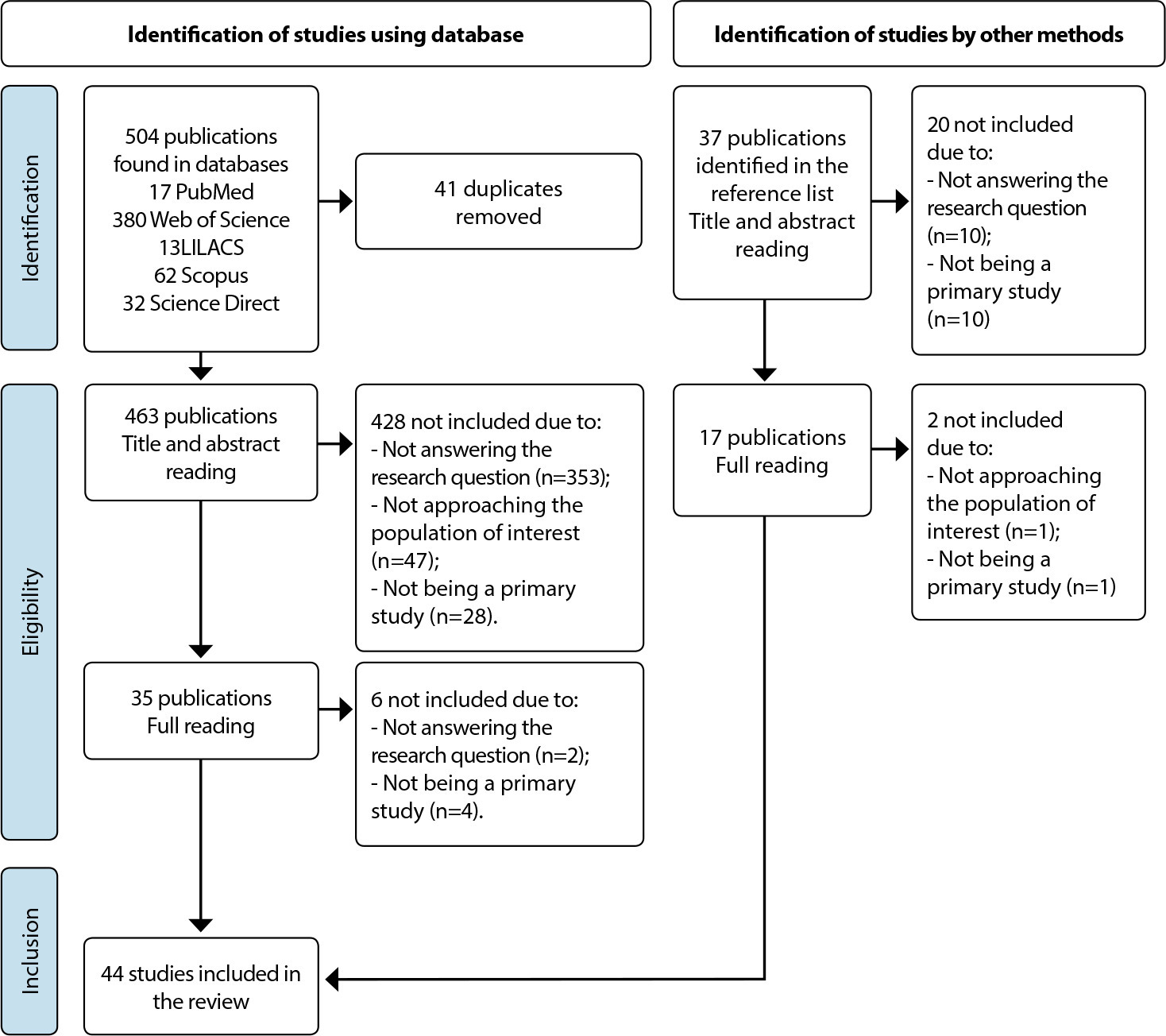-
ORIGINAL ARTICLE
Development and content validation of a risk classification instrument
Revista Brasileira de Enfermagem. 2024;77(4):e20230502
09-06-2024
Abstract
ORIGINAL ARTICLEDevelopment and content validation of a risk classification instrument
Revista Brasileira de Enfermagem. 2024;77(4):e20230502
09-06-2024DOI 10.1590/0034-7167-2023-0502
Views0See moreABSTRACT
Objective:
Develop and validate the content of an instrument for patient risk classification in emergency services of Primary Health Care.
Method:
The study included two stages: item generation and content validity. A literature review and retrospective analysis of medical records were conducted to create the instrument items. The Content Validity Ratio (CVR) was used to assess agreement among judges during content validation.
Results:
In the first and second rounds, 75 and 71 judges validated the risk classification instrument, respectively. The minimum adherence score for the latent variable item based on the final number of judges was 0.22 and 0.18; thus, 52 items, divided into three classification categories (red, orange, and yellow), were retained.
Conclusion:
The instrument was considered valid regarding clarity, relevance, pertinence, and agreement regarding the severity indicated in the item.
-
REVIEW
Parents’ or legal guardians’ beliefs and attitudes about childhood vaccination: a scoping review
Revista Brasileira de Enfermagem. 2024;77(4):e20240126
09-06-2024
Abstract
REVIEWParents’ or legal guardians’ beliefs and attitudes about childhood vaccination: a scoping review
Revista Brasileira de Enfermagem. 2024;77(4):e20240126
09-06-2024DOI 10.1590/0034-7167-2024-0126
Views0See moreABSTRACT
Objective:
to map scientific evidence about perceptions, beliefs, knowledge and attitudes of parents or legal guardians of children under 5 years of age regarding routine childhood vaccination.
Methods:
a scoping review, conducted in accordance with the JBI framework. The searches were carried out in the PubMed/MEDLINE, Web of Science, Scopus and LILACS databases. A total of 5,535 studies were returned and 77 were selected, which met the inclusion criteria.
Results:
perceptions related to interaction with healthcare professionals and services, with family organization and structure, with social interaction and public policies, cultural, religious and personal beliefs, knowledge about vaccination schedule, vaccination and immunization process and sources of information are the main factors mapped and which can positively or negatively influence parents’ or legal guardians’ attitudes towards vaccinating children.
Conclusions:
the findings allow us to identify factors related to parents’ perception and beliefs about childhood vaccination.

-
ORIGINAL ARTICLE
Construction and validation of an instrument for event-related sterility of processed healthcare products
Revista Brasileira de Enfermagem. 2024;77(4):e20240021
09-06-2024
Abstract
ORIGINAL ARTICLEConstruction and validation of an instrument for event-related sterility of processed healthcare products
Revista Brasileira de Enfermagem. 2024;77(4):e20240021
09-06-2024DOI 10.1590/0034-7167-2024-0021
Views0See moreABSTRACT
Objective:
To construct and validate an instrument to assess events related to maintaining the sterility of processed healthcare products.
Methods:
This methodological study developed the instrument through analysis by a panel of experts, focusing on the integrity of commonly used packaging: spunbond-meltblown-spunbond and medical-grade paper. The instrument was analyzed using the Content Validity Index and Content Validity Ratio (≥ 0.80) and modified Kappa (≥ 0.74). The instrument underwent pre-testing.
Results:
Six experienced professionals participated in the expert panel. After two rounds, the final version of the instrument contained five dimensions. In the pre-test, 30 nursing professionals participated, of whom 86.67% considered the instrument good, and 90% found it understandable.
Conclusion:
The construction and validation followed literature recommendations. The instrument is available, aiding in the safe use of processed healthcare products.
-
REVIEW
Nursing students’ mindfulness and emotional regulation: an integrative review
Revista Brasileira de Enfermagem. 2024;77(4):e20230466
09-06-2024
Abstract
REVIEWNursing students’ mindfulness and emotional regulation: an integrative review
Revista Brasileira de Enfermagem. 2024;77(4):e20230466
09-06-2024DOI 10.1590/0034-7167-2023-0466
Views0See moreABSTRACT
Objective:
to identify the scientific evidence available in national and international literature on the relationships between nursing students’ mindfulness and emotional regulation.
Methods:
an integrative literature review, in four databases, with a time frame from January 2002 to December 2022. Articles in English, Spanish and Portuguese available in full were included.
Results:
the sample consisted of six original articles, predominantly with a quantitative approach, with cross-sectional designs standing out.
Conclusion:
the synthesis of scientific production revealed that there is a lack of research at national and international level on the subject with experimental and qualitative designs that enable conclusions about cause and effect and/or take into account subjective experiences of the applicability of mindfulness-based practice in nursing students’ emotional regulation.

-
ORIGINAL ARTICLE
Determining factors for COVID-19 vaccine hesitancy among Brazilians: a study using structural equation modeling
Revista Brasileira de Enfermagem. 2024;77:e20240112
08-30-2024
Abstract
ORIGINAL ARTICLEDetermining factors for COVID-19 vaccine hesitancy among Brazilians: a study using structural equation modeling
Revista Brasileira de Enfermagem. 2024;77:e20240112
08-30-2024DOI 10.1590/0034-7167-2024-0112
Views0See moreABSTRACT
Objectives:
to investigate the factors influencing vaccine hesitancy against COVID-19 among Brazilians.
Methods:
this research employed an observational and analytical approach, utilizing a web-based survey. Data collection took place in 2020, and data analysis was conducted using structural equation modeling.
Results:
the prevalence of vaccine hesitancy was found to be 27.5% (1182 individuals). There is a negative correlation between belief in conspiracy theories and social influence. Among the various beliefs associated with vaccination intentions, only conspiracy beliefs exhibited significant predictive value. Thus, the findings suggest that personal beliefs significantly impact hesitancy towards vaccination, and also indicate that trust in governmental bodies is inversely related to hesitancy.
Conclusions:
vaccine hesitancy emerges as a multifaceted phenomenon influenced by a complex array of factors, including personal beliefs, trust in governmental bodies, and healthcare systems.

-
ORIGINAL ARTICLE
Risk of smoking cessation treatment dropout: a cohort to help (re)think care
Revista Brasileira de Enfermagem. 2024;77:e20230537
08-30-2024
Abstract
ORIGINAL ARTICLERisk of smoking cessation treatment dropout: a cohort to help (re)think care
Revista Brasileira de Enfermagem. 2024;77:e20230537
08-30-2024DOI 10.1590/0034-7167-2023-0537
Views0See moreABSTRACT
Objectives:
to evaluate the relative risk of smoking cessation treatment dropout during its intensive phase.
Methods:
a retrospective and quantitative cohort study was developed from the electronic medical records of individuals who started smoking cessation treatment between 2015 and 2019 at a specialty clinic in a city in the interior of São Paulo, Brazil. The relative risk of dropping out of treatment was calculated using the Poisson regression model.
Results:
it was observed that out of the 396 (100.0%) individuals who started the treatment, 109 (27.5%) abandoned it before the end of the intensive phase. For each one-year increase in age, the risk of dropping out of smoking cessation treatment decreased by an average of 2%.
Conclusions:
the risk of dropping out of smoking cessation treatment is higher among younger individuals. It is necessary to rethink the care offered to younger adults to promote the continuity of treatment.

-
ORIGINAL ARTICLE
Meanings attributed to changes experienced by individuals after COVID-19 hospitalization
Revista Brasileira de Enfermagem. 2024;77:e20230122
08-30-2024
Abstract
ORIGINAL ARTICLEMeanings attributed to changes experienced by individuals after COVID-19 hospitalization
Revista Brasileira de Enfermagem. 2024;77:e20230122
08-30-2024DOI 10.1590/0034-7167-2023-0122
Views0See moreABSTRACT
Objectives:
to understand the meanings attributed to the experiences of individuals after hospitalization for COVID-19.
Methods:
qualitative study, with a theoretical framework based on Symbolic Interactionism and a methodological approach grounded in Grounded Theory. Nineteen participants who had moderate and severe forms of COVID-19 after hospitalization were interviewed. Data collection took place between April and November 2021 through online interviews, and the data were analyzed using initial and focused coding in the MAXQDA software.
Results:
the data illustrate new meanings attributed to different aspects of life after hospitalization, including relationships with others, the environment, physical and mental health, finances, identity, and interactions with a new social reality.
Conclusions:
the meanings are intrinsically linked to the value of interpersonal relationships, the perception of their impact, and the consequences after hospitalization. This allows professionals to understand the importance of this information to improve care and prepare for future epidemics.

-
ORIGINAL ARTICLE
Fatores determinantes para à hesitação vacinal contra a COVID-19 em brasileiros: estudo utilizando modelagem de equações estruturais
Revista Brasileira de Enfermagem. 2024;77:e20240112
08-30-2024
Abstract
ORIGINAL ARTICLEFatores determinantes para à hesitação vacinal contra a COVID-19 em brasileiros: estudo utilizando modelagem de equações estruturais
Revista Brasileira de Enfermagem. 2024;77:e20240112
08-30-2024DOI 10.1590/0034-7167-2024-0112
Views0See moreRESUMEN
Objetivos:
investigar los factores que influyen en la vacilación ante la vacuna contra la COVID-19 entre los brasileños.
Métodos:
esta investigación empleó un enfoque observacional y analítico, utilizando una encuesta en línea. La recolección de datos se llevó a cabo en 2020 y el análisis de los datos se realizó utilizando el modelado de ecuaciones estructurales.
Resultados:
la prevalencia de la vacilación ante la vacuna fue del 27,5% (1182 individuos). Existe una correlación negativa entre la creencia en teorías de conspiración y la influencia social. Entre las diversas creencias asociadas con las intenciones de vacunación, solo las creencias en conspiraciones mostraron un valor predictivo significativo. Así, los resultados sugieren que las creencias personales impactan significativamente la vacilación ante la vacunación y también indican que la confianza en los órganos gubernamentales está inversamente relacionada con la vacilación.
Conclusiones:
la vacilación ante la vacuna emerge como un fenómeno multifacético influenciado por una amplia gama de factores, incluyendo las creencias personales, la confianza en los órganos gubernamentales y los sistemas de salud.
-
REVIEW
Financial-patrimonial elder abuse: an integrative review
Revista Brasileira de Enfermagem. 2019;72:328-336
12-05-2019
Abstract
REVIEWFinancial-patrimonial elder abuse: an integrative review
Revista Brasileira de Enfermagem. 2019;72:328-336
12-05-2019DOI 10.1590/0034-7167-2018-0703
Views0See moreABSTRACT
Objective:
to analyze the available evidence in the nursing literature about financial-patrimonial elder abuse.
Method:
integrative review of articles indexed in the databases CINAHL, Scopus, Web of Science, LILACS and MEDLINE, from 2007 to 2017. The combination of controlled and uncontrolled descriptors was used in Portuguese, English and Spanish.
Results:
15 studies developed in seven countries were included. In the thematic analysis, three categories emerged: epidemiological data, risk factors and institutions providing services to the elderly. The occurrence of this type of violence concomitantly to the other subtypes was highlighted among the most frequent.
Final considerations:
the literature points to important epidemiological data, risk factors and characteristics of this type of violence, including within institutions providing services to the elderly, in different countries, essential aspects for structuring and rethinking public policies for protection and appreciation of the elderly.

-
ORIGINAL ARTICLE
Vulnerability in the health of young transgender women living with HIV/AIDS
Revista Brasileira de Enfermagem. 2020;73(5):e20190046
07-06-2020
Abstract
ORIGINAL ARTICLEVulnerability in the health of young transgender women living with HIV/AIDS
Revista Brasileira de Enfermagem. 2020;73(5):e20190046
07-06-2020DOI 10.1590/0034-7167-2019-0046
Views0ABSTRACT
Objectives:
to analyze the health vulnerability of young female transgender living with HIV/AIDS.
Methods:
qualitative, descriptive, and exploratory study, based on the theoretical reference of Social Representation and concept of vulnerability; developed with six transgender women in a reference Hospital for HIV/AIDS. We analyzed the individual interviews, recorded, and transcribed in full, in the IRaMuTeQ software by Similitude Analysis.
Results:
the thematic categories are listed based on the Ayres reference: 1) Individual dimension of vulnerability to HIV/AIDS; 2) Social dimension of vulnerability to HIV/AIDS; 3) Programmatic dimension of the vulnerability.
Final Considerations:
the young female transsexual living with HIV/AIDS experience a context of vulnerability in health associated with a lack of knowledge and difficulties for the realization of self-care. The study evidenced the representations of social abjection and unpreparedness of the health team that compose the Primary Attention in Health in promoting qualified assistance for the execution of the effective and humanized care.
Keywords:Acquired Immunodeficiency SyndromeHealth VulnerabilityHIV InfectionsNursingTransgender PersonsSee more -
EDITORIAL
Women’s health during pregnancy, childbirth and puerperium: 25 years of recommendations from international organizations
Revista Brasileira de Enfermagem. 2019;72:1-2
12-13-2019
Abstract
EDITORIALWomen’s health during pregnancy, childbirth and puerperium: 25 years of recommendations from international organizations
Revista Brasileira de Enfermagem. 2019;72:1-2
12-13-2019DOI 10.1590/0034-7167-2019-72suppl301
Views0Women’s health during pregnancy, childbirth and the puerperium has been a concern of international bodies since the 1994 United Nations International Conference on Population and Development in Cairo, Egypt. This conference had as theme Women’s Health and Safe Motherhood. The rationale for choosing the theme was that pregnancy and childbirth-related complications were among the leading […]See more -
ORIGINAL ARTICLE
(Dis)continuation of care of the pre-term newborn at the border
Revista Brasileira de Enfermagem. 2020;73(3):e20180827
04-22-2020
Abstract
ORIGINAL ARTICLE(Dis)continuation of care of the pre-term newborn at the border
Revista Brasileira de Enfermagem. 2020;73(3):e20180827
04-22-2020DOI 10.1590/0034-7167-2018-0827
Views0See moreABSTRACT
Objectives:
to understand how continuation of care for the preterm newborn in the health care network at the border.
Methods:
the Grounded Theory was the methodological framework. Data were collected through 17 semi-structured interviews between July 2016 and March 2017.
Results:
“Describing the structure and functioning of the Child Nutrition Center” represents the context; “Experiencing and signifying premature birth” are the causal conditions; “Identifying conditions that intervene in the process of continuation of care for the preterm newborn” are the intervening conditions; “Ensuring continuation of care for the preterm newborn” are strategies; “Identifying (dis)continuation of care flows for the preterm newborn at the border” are the study’s consequences and phenomenon.
Final Considerations:
there is a need to plan referral and counter-referral flows of the preterm newborn and the commitment of public health managers to ensure continuation of care.
-
ORIGINAL ARTICLE
Wise Infant Development®: creation of a software for teaching in pediatric nursing education
Revista Brasileira de Enfermagem. 2022;75(5):e20210466
05-09-2022
Abstract
ORIGINAL ARTICLEWise Infant Development®: creation of a software for teaching in pediatric nursing education
Revista Brasileira de Enfermagem. 2022;75(5):e20210466
05-09-2022DOI 10.1590/0034-7167-2021-0466
Views0See moreABSTRACT
Objectives:
to create a software application for nursing education on child development assessment.
Methods:
this is a methodological applied research developed in three stages: analysis, design, and development. Product quality characteristics from the ISO/IEC 25010 standards were adopted. The programming language used was JavaScript. The educational software was developed based on a constructivist cognitive theory.
Results:
it was possible to create the software from the following quality metrics: functional suitability, reliability, usability, performance efficiency, compatibility, security, maintainability, and portability. The technology addresses child development in physical, cognitive, and psychosocial domains and how this assessment should be carried out in Brazil. The software has pre and posttests, 5 learning modules, certificate issuance, support for doubts, and an administrative panel. Final Considerations: it is concluded that the software adds to the existing tools for child development monitoring, facilitating students’ knowledge acquisition in promoting child health.

-
EDITORIAL
Nursing and the Sustainable Development Goals (SDGs): An Essential Commitment
Revista Brasileira de Enfermagem. 2023;76(6):e760601
12-04-2023
Abstract
EDITORIALNursing and the Sustainable Development Goals (SDGs): An Essential Commitment
Revista Brasileira de Enfermagem. 2023;76(6):e760601
12-04-2023DOI 10.1590/0034-7167.2023760601
Views0The Sustainable Development Goals (SDGs) are a global initiative launched by the United Nations (UN) in September 2015 as part of the 2030 Agenda for Sustainable Development, whose objectives summarize a universal call to action to end poverty, protect the environment and ensure that all people have access to opportunities and well-being, all in an […]See more -
REVIEW
Health needs of mothers of children with Congenital Zika Syndrome: an integrative review
Revista Brasileira de Enfermagem. 2022;75:e20210540
04-22-2022
Abstract
REVIEWHealth needs of mothers of children with Congenital Zika Syndrome: an integrative review
Revista Brasileira de Enfermagem. 2022;75:e20210540
04-22-2022DOI 10.1590/0034-7167-2021-0540
Views0ABSTRACT
Objectives:
to evidence and analyze the health needs of mothers of children with Congenital Zika Syndrome.
Methods:
a total of 44 articles published between October/2015 and March/2021 on PubMed, LILACS, Scopus, Web of Science and Science Direct were included. The RTI bank and CASP score were applied to classify the methodological quality of the studies. Reflective content analysis and Cecílio and Matsumoto’s taxonomy were used for analysis. Visual map was used as a technique for presenting the results.
Results:
mothers need access to social protection, family-centered, multi-professional empathetic monitoring, cultivating bonds and affection by professionals, sharing of care between health network services, strengthening the social support network and fostering coexistence groups between them.
Final Considerations:
intersectoral initiatives must be implemented for better housing conditions, fighting stigma, holding parents accountable and resuming life project.
Keywords:CaregiversCongenital AbnormalitiesHealth Service Needs and DemandMaternal and Child HealthZika Virus InfectionSee more
-
REFLECTION
War against the COVID-19 pandemic: reflection in light of Florence Nightingale’s nursing theory
Revista Brasileira de Enfermagem. 2020;73:e20200371
12-21-2020
Abstract
REFLECTIONWar against the COVID-19 pandemic: reflection in light of Florence Nightingale’s nursing theory
Revista Brasileira de Enfermagem. 2020;73:e20200371
12-21-2020DOI 10.1590/0034-7167-2020-0371
Views0See moreABSTRACT
Objective:
To reflect on the relationship and importance of the environmental theory regarding practices for promotion, prevention, and treatment of COVID-19.
Methods:
A theoretical-reflexive study about the COVID-19 pandemic in light of the environmental theory proposed by Florence Nightingale.
Results:
It is observed that the application of the theoretical foundations proposed by the environmental theory is related to the current practices used in the fight against the COVID-19 pandemic.
Final Considerations:
It is believed that the theoretical basis is fundamental for the critical-reflexive training of the nursing professional, for the consolidation of Nursing as a science; therefore, it could provide a foundation in nowadays battle against the pandemic.
Search
Search in:
Nuvem de Tags
Aged (144) Atenção Primária à Saúde (239) COVID-19 (104) Cuidados de Enfermagem (269) Educação em Enfermagem (151) Educação em Saúde (139) Enfermagem (930) Estudos de Validação (131) Health Education (144) Idoso (208) Mental Health (149) Nursing (987) Nursing Care (306) Patient Safety (151) Primary Health Care (284) Qualidade de Vida (104) Quality of Life (106) Saúde Mental (145) Segurança do Paciente (150) Validation Studies (108)



